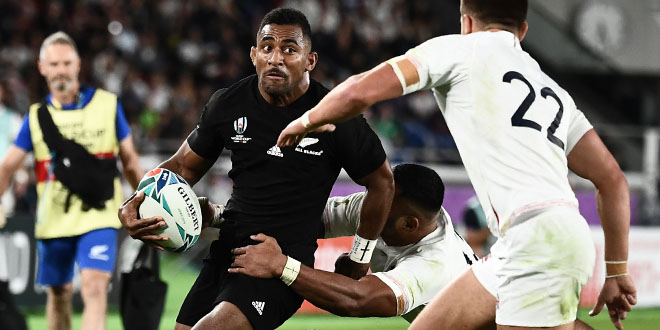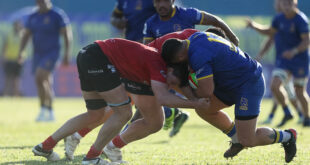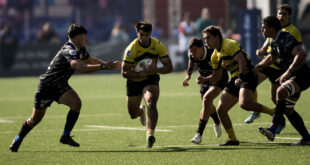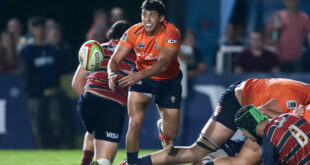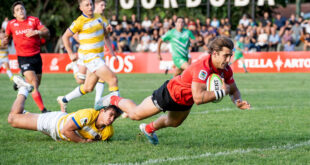The 2022 Rugby Championship is the 11th edition of the competition since expanding to include Argentina in 2012. It was originally the Tri Nations; an annual competition involving Australia, New Zealand and South Africa. The first edition was played in 1996.
This article documents players that qualify to represent a country that they were not born in, and how they do so under World Rugby Regulations. It also attempts to identify, where players were developed prior to their senior careers.
Eligibility laws at international level have changed back-and-forth to involve tightening and loosening. On the one hand, recent changes resulted in Tonga fielding capped All Blacks and Wallabies under Union Transfer law. On the other hand, Spain was disqualified from Rugby World Cup 2023 after Gavin van den Berg was found not eligible. The scandal saw Spain out of the World Cup after had qualified. The player escaped punishment. He had had his passport falsified in order to play for Alcobendas.
The Union Transfer regulation is a reverse of the revisions in May of 2017 that tightened eligibility by extending the consecutive residency requirement from three to five years. A new clause also allowed for players to qualify via cumulative residency of 10 years. Those changes were scheduled to begin on January 1, 2021, but World Rugby subsequently delayed the change by one year.
There were 130 Foreign-Born players at RWC 2015. The number increased to 144 for RWC 2019. ARN projects the number to be higher again at RWC 2023 despite Argentina, Chile, Georgia, Namibia, South Africa and Uruguay expected to field fully homegrown teams at the tournament.
This is an original work researched and written by Americas Rugby News.

NEW ZEALAND (12)
With twelve foreign born players, New Zealand has the most of the four competitors. This marks a change as New Zealand has more than Australia in 2022 unlike prior editions of the tournament. The quantity of players is also much larger than previously. There were seven foreign-born players on New Zealand’s rosters in 2021 and 2017 and three in 2018.
Three of the twenty-two players qualify via family ancestry and nine via residency. The three family-qualified players are all products of the New Zealand rugby system. Aidan Ross, Ethan de Groot and Akira Ioane all moved to New Zealand as infants.
The residency players fall into two categories. First, players who moved as children. Second, players who moved to New Zealand to obtain eligibility as adults. Leicester Fainga’anuku moved to New Zealand aged 2 and Ofa Tu’ungafasi did so at the age of 14. Others arrived in between. Finlay Christie moved aged 7. Samisomi Taukei’aho completed three-years-residency before adulthood.
Like Taukei’aho, Shannon Frizzel earned a scholarship to play in New Zealand following a tour to the country while playing for Tonga at junior level. Frizzel, Folau Fakatava and Sevu Reece qualified to play for New Zealand as adults. These All Blacks are not homegrown.
| PLAYER | POS | BORN IN | TRAINED IN | ELIGIBILTY | OTHER REP. |
| Ethan de Groot | LH | Australia | New Zealand | Parent | – |
| Ofa Tu’ungafasi | LH | Tonga | New Zealand | Residency (2009) | – |
| Samisomi Taukei’aho | HK | Tonga | Tonga | Residency (2017) | Tonga u15 |
| Aidan Ross | TH | Australia | New Zealand | Parent | – |
| Nepo Laulala | TH | Samoa | New Zealand | Residency (2007) | – |
| Shannon Frizzel | FL | Tonga | Tonga | Residency (2017) | Tonga u20, Tonga u17 Soccer |
| Akira Ioane | FL | Japan | New Zealand | Parent | – |
| Finlay Christie | SH | Scotland | New Zealand | Residency (2005) | – |
| Folau Fakatava | SH | Tonga | Tonga | Residency (2022) | Tonga Touch Rugby |
| Roger Tuivasa-Sheck | FH | Samoa | New Zealand | Residency (1998) | – |
| Leicester Fainga’anuku | WI | Tonga | New Zealand | Residency (2004) | – |
| Sevu Reece | WI | Fiji | Fiji | Residency (2017) | – |
HISTORICAL NUMBERS
2021 – 7
2020 – 6
2019 – 5
2018 – 3
2017 – 7
2016 – 6

AUSTRALIA (8)
The 2022 Rugby Championship sees not only New Zealand with a substantially increased total of foreign-born players, it also sees Australia with significantly fewer. There were eleven on the 2021 roster and thirteen in 2020. In 2022 the number is below ten for the first time.
As was the case in 2021, all of Australia’s foreign-born players in 2022 qualify via residency. They consist of two varieties. First, players who arrived young to be developed by Australian rugby. Second, players who were not developed primarily by Australian rugby.
Four of the eight players were born in New Zealand. Quade Cooper, Lalakai Foketi, and Noah Lolesio, moved to Australia as children. They were developed by the Australian rugby system. Irae Simone is not homegrown; he gained eligibility as an adult.
Marika Koroibete, Hunter Paisami, Taniela Tupou and Suliasi Vunivalu were not developed primarily by Australian rugby. Koroibete and Vunivali are eligible despite having played for Fiji in rugby league. Paisami was born in Samoa and raised in New Zealand. He gained eligibility as an adult; he moved to Australia at the age of 17.
| PLAYER | POS | BORN IN | TRAINED IN | ELIGIBILITY | OTHER REP. |
| Taniela Tupou | TH | Tonga | New Zealand | Residency (2017) | Tonga u15 |
| Quade Cooper | FH | New Zealand | Australia | Residency (2004) | – |
| Noah Lolesio | FH | New Zealand | Australia | Residency (2013) | – |
| Lalakai Foketi | CE | New Zealand | Australia | Residency (2011) | – |
| Hunter Paisami | CE | Samoa | New Zealand | Residency (2018) | Samoa u20 |
| Irae Simone | CE | New Zealand | New Zealand | Residency (2017) | New Zealand Schools u18 |
| Marika Koroibete | WI | Fiji | Fiji | Residency (2015) | Fiji Rugby League |
| Suliasi Vunivalu | WI | Fiji | Fiji | Residency (2019) | Fiji Rugby League |
HISTORICAL NUMBERS
2021 – 11
2020 – 13
2019 – 12
2018 – 13
2017 – 12
2016 – 14
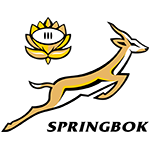
SOUTH AFRICA (0)
All of South Africa’s players were born and raised in South Africa.
HISTORICAL NUMBERS
2021 – 0
2020 – n/a (did not Compete)
2019 – 1
2018 – 1
2017 – 2
2016 – 1

ARGENTINA (0)
All 34 players on Argentina’s roster are from Argentina. Lucas Paulos was born in Buenos Aires but first played rugby for Club de Rugby Majadahonda in Spain at the age of five. He played for Spain u16 and u18. He moved to the Mont de Marsan academy in France at the age of 16 and returned to Argentina aged 18. He played for Argentina u20 and Super Rugby for Los Jaguares.
The changes wherein players can change countries do not include residency. This means that Paulos will not be eligible for Spain; his decade playing in the country as a child is not appropriate according to the laws. There are other instances such as Axel Muller who is from Argentina and interested in playing for the USA. He lived in Arizona for a decade and holds a U.S passport but World Rugby’s laws do not make him eligible for the USA neither Paulos for Spain.
HISTORICAL NUMBERS
2021 – 1
2020 – 1
2019 – 1
2018 – 1
2017 – 0
2016 – 0
 Americas Rugby News Rugby news from across the Americas!
Americas Rugby News Rugby news from across the Americas!
